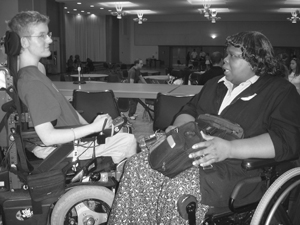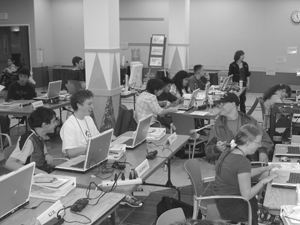Chapter Six
Set Personal, Academic, and Career Goals. Keep Your Expectations High.
It is today that we create the world of the future.
— Eleanor Roosevelt —
When seventy-one adults with specific learning disabilities who had achieved success in their careers were interviewed, researchers found patterns to their success (Reiff, Gerber, & Ginsberg, 1992). The success factors were divided into two categories:
- internal decisions
- external manifestations
Successful adults exhibited a powerful desire to succeed and were goal-oriented. A strong motivator was a desire to gain control of their lives. They recognized that their disabilities presented them with significant challenges that require determination and hard work to overcome.

Adults can play important roles in helping young people with disabilities set their goals and keep their expectations high. As pointed out by a special education teacher who has dyslexia:
A combination of people and events has helped me maintain high standards. This all started during the summer months when my mother and neighbor friend pushed me to improve my academic skills. At the time it wasn't high standards that I was working for but rather escaping embarrassment. I wanted no one to know I had a disability and would have done most anything to hide it. These summer study sessions provided a stepping stone for future success in high school and college. Success builds itself. This was my start to expecting to do well in school.
Dreaming has a bad reputation because it's associated with doing nothing rather than seen as an important part of a process. For an individual, dreaming can serve the same function as brainstorming serves for a group—getting creative ideas on the table without dismissing them too quickly.
Adults sometimes worry about the "unrealistic" dreams of young people with disabilities, perhaps because of their desire to protect them from failure. Once, I was having lunch with a second-grader whom I was teaching to use a computer. He has no use of his arms and legs as a result of a birth defect and uses his mouth alone to control the computer. Someone at our table asked the standard kid question, "What do you want to be when you grow up?" Without hesitation, he said, "A fireman." The adults were noticeably silent. I asked why he wanted to be a fireman. He responded in the I-can't-believe-how-dumb-adults-are way that only kids know how to do: "Because I want to put out fires." The next day one of the women who had been at the table approached me privately to say, "Wasn't that sad when he said he wanted to be a fireman?" I asked what she meant and she said, "Because, obviously, he will never be one." I said, "Most kids who want to be firemen don't become firemen—he's just like the rest of them." The only difference is that we adults get more concerned when children with disabilities dream of things that may not come to pass than we do when children without disabilities do the same thing. My little friend and I did talk about this topic again—several times. He concluded, among other things, that the fire engine would need to be wheelchair-accessible and someone would need to help him hold the hose. Finally, he decided that all of his accommodations would take away a lot of the fun of being a fireman. By that time he learned that there was the job of dispatcher—he would do that! (Another dream that he did not ultimately pursue, even though this job was entirely within his reach.)

The acts of dreaming and then thinking through the steps to reaching that dream are key to leading a fulfilling life. All children, including those with disabilities, need to dream—dream big.
Completing the following online activities will help young people:
- Set personal, academic, and career goals.
- Plan for success.
- Keep their expectations high.
The electronic mentoring community administrator can select appropriate messages from the following examples and send the Mentor Tip messages to the mentors only and the E-Community Activity messages to the entire online mentoring community. Use these examples to stimulate other ideas for online discussions. It is desirable that, ultimately, most discussion topics come from the mentors and protégés.